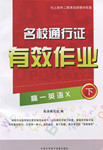题目内容
On Thursday I will have to decide what I want myself to 1. ________
do over a weekend. I am thinking of making a trip 2. ________
to London, and visit the British Museum and some 3. ________
parks. But I have spent most my money, so I cannot 4. ________
even go out of town. I may go to a film, or a concert. 5. ________
Yes, a concert can be very excited. You can watch your 6. ________
stars while enjoying your favorite music. So then, a 7. ________
concert cost so much. I may just listen to music. I have 8. ________
some records giving to me as birthday gifts. If I listen 9. ________
to my own records, there are no need to spend money. 10. ________
All right. That’s what I’m going to do.
解析:
第1题:正确的表述应该是what I want to do,所以应去掉myself。 第2题:weekend指的是特定的周末,其前面的a应改为the。 第3题:visit为与making平行的成分,所以应改为visiting。 第4题:“我的大部分钱”的正确表达形式为most of my money,所以most和my之间应加上of。 第5题:无错。 第6题:a concert会“让人激动”,所以excited应改为exciting。 第7题:由上下文内容看,此处需要的是表转折关系的连词,所以应将so改为but。 第8题:句子的主语concert为单数第三人称,其后的谓语动词应采用相应的形式,所以应将其改为costs。 第9题:此处的give应采用表示被动的过去分词形式,因其逻辑主语为动作的接受者,所以giving应改为 given。 第10题:no need为单数形式,所以应将are改为 is。
|

 名校通行证有效作业系列答案
名校通行证有效作业系列答案LONDON (Reuters) — Children are dying for lack of drugs tailored to their needs, according to the World Health Organization (WHO), which launched a global campaign on Thursday to promote more research into child medicine.
More than half of the drugs currently used to treat children in the industrialized world have not been specifically tested on youngsters.
The problem is even worse in developing countries where price remains a major barrier and 6 million children die each year from treatable conditions.
In the case of HIV/AIDS, the few existing pediatric therapies(儿科的疗法)developed for children generally cost three times more than adult ones.
As a result, clinicians lack clear guidelines on the best drug to use and often have to guess at the correct dose.
Fortunately, the WHO has drawn up the first international List of Essential Medicines for Children, containing 206 products considered safe for children.
“But a lot remains to be done. There are priority medicines that have not been adapted for children’s use or are not available when needed,” said Dr Hans, the U.N. agency’s director of medicines policy and standards.
Medicines that need to be adapted to children’s needs include many antibiotics, pain drugs as well as combination pills for HIV/AIDS, tuberculosis and malaria.
The agency is building an Internet entrance linking to clinical trials carried out in children and will launch a Web site with the information early next year.
Testing medicines on children has always been a controversial issue, since good ethical(伦理的)practice requires informed agreement from people participating in clinical trials, which is difficult to obtain in the case of children.
As a result, research-based drug companies have been wary of developing child-friendly medicines and general companies have been slow to produce them at lower cost.
In an attempt to deal with the issue, both Europe and the United States now have special rules offering extended patent protection for drugs that have been tested on children.
【小题1】Which of the following is the best title of the passage?
| A.A Global Campaign to Promote Research into AIDS Medicine |
| B.WHO Says Children are Dying for Lack of Child-sized Drugs |
| C.Many People are Concerned about Children’s Drugs |
| D.Measures Taken to Develop Child-friendly Medicine Quickly |
| A.Pain killers. | B.Tuberculosis. |
| C.AID pills. | D.Flu pills. |
| A.It is against good ethical practice |
| B.Children shouldn’t take part in clinical trials. |
| C.It is hard to get informed agreement from children tested. |
| D.Parents don’t allow their children to be tested on medicine. |
| A.fast | B.fond | C.cautious | D.uninterested |
| A.There is still a long way to go on children’s medicine. |
| B.An Internet entrance is being built to link to clinical trials carried out in children. |
| C.Both Europe and the United States now have special rules offering extended patent protection for children’s drugs. |
| D.Less than half of the drugs currently used to treat children in the industrialized world have not been specifically tested on youngsters |